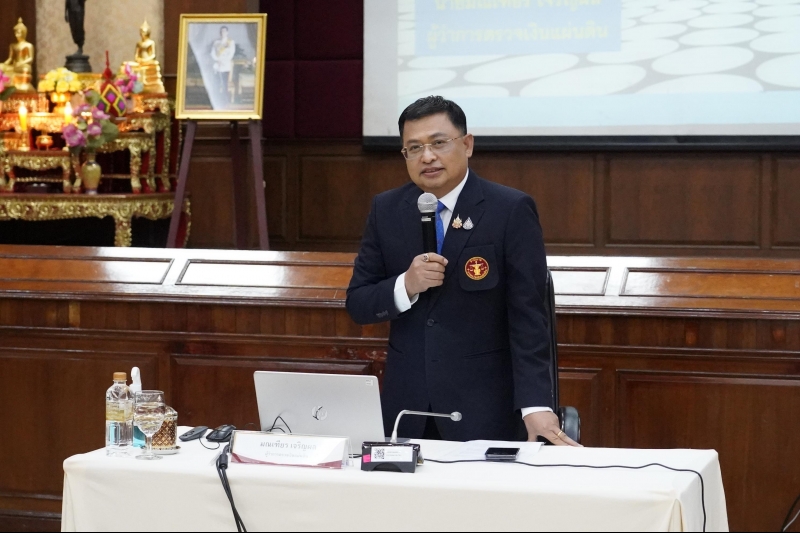In the dynamic field of public sector auditing, traditional methods often emphasize exhaustive processes, extensive fieldwork, and comprehensive checks.
However, in an era where efficiency and results are paramount, Mr. Monthien Charoenpol, the Auditor General of Thailand, has introduced a transformative vision covered the phrase "Less Audit, More Impact."
Less Audit, More Impact is the concept challenges the status quo, advocating for a strategic approach that maximizes the effectiveness of audits while minimizing unnecessary resource expenditure.
Streamlining Audits for Greater Efficiency
The core of "Less Audit, More Impact" lies in the belief that the quantity of audits does not necessarily correlate with their effectiveness. Instead, Mr. Charoenpol argues that a more focused and strategic approach can yield better results. By concentrating audit efforts on areas with the highest risk or potential for improvement, auditors can deliver more significant impacts without spreading their resources too thin.
This approach calls for a rethinking of audit methodologies. Rather than conducting numerous audits with a broad but shallow scope, Mr. Charoenpol’s vision emphasizes deep, targeted audits that are driven by data and focused on key issues. This strategy not only conserves resources but also ensures that the audits conducted are meaningful and actionable.
Harnessing Digital Tools for e-Audit
A key enabler of this vision is the integration of digital technology into the auditing process. The use of e-audit platforms allows for the efficient processing and analysis of vast amounts of data. This technological shift enables auditors to focus on interpreting data and identifying key insights, rather than getting bogged down in manual processes.
By leveraging e-audit tools, the State Audit Office of the Kingdom of Thailand can conduct audits more quickly and accurately, enabling a shift from quantity to quality. This not only enhances the overall efficiency of the auditing process but also ensures that the findings are based on comprehensive data analysis, leading to more reliable and impactful recommendations.
Impact-Oriented Auditing
Mr. Monthien ’s vision is rooted in the idea that every audit should have a clear and measurable impact. This means that audits are not just exercises in compliance but tools for driving real change. The goal is to ensure that the results of each audit lead to improvements in governance, efficiency, and accountability within public institutions.
To achieve this, the auditing process is increasingly focused on identifying systemic issues and recommending practical solutions. The audits are designed to be catalysts for change, highlighting areas where public institutions can enhance their operations and better serve the public interest.
Follow-Up and Accountability
One of the most critical elements of the "Less Audit, More Impact" vision is the emphasis on follow-up audits. Ensuring that recommendations are implemented is just as important as identifying issues in the first place. Mr. Monthien advocates for a systematic approach to follow-up, where auditors revisit the audited entities to ensure that corrective actions have been taken.
This follow-up process is crucial for maintaining accountability and ensuring that the impact of the audit is sustained over time. It transforms the audit from a one-time assessment into an ongoing process of improvement, where public institutions are continuously held accountable for their performance.
Data-Driven Decision Making
Finally, the "Less Audit, More Impact" approach relies heavily on data-driven decision-making. By utilizing robust data analytics, auditors can identify trends, assess risks, and prioritize areas for investigation. This ensures that audits are not only more efficient but also more effective, as they are based on a solid understanding of the underlying issues.
Data-driven audits allow for more targeted recommendations and more precise follow-up actions. This approach aligns with global trends in public governance, where transparency and accountability are increasingly driven by data.
Less Audit More Impact : A New Paradigm for Smart Auditing
"Less Audit, More Impact" represents a paradigm shift in public sector auditing. It challenges the traditional notion that more is better, instead advocating for a strategic, efficient, and impact-oriented approach.
Under Mr. Monthien Charoenpol’s leadership, this vision is helping to transform how audits are conducted in Thailand, ensuring that they are not just thorough but also meaningful and effective.
By focusing on high-impact areas, leveraging digital tools, and prioritizing follow-up, this approach ensures that audits contribute to real improvements in public governance. It is a forward-looking strategy that aligns with the demands of modern public administration, where efficiency, accountability, and results are more important than ever.
Dr. Sutthi Suntharanurak
